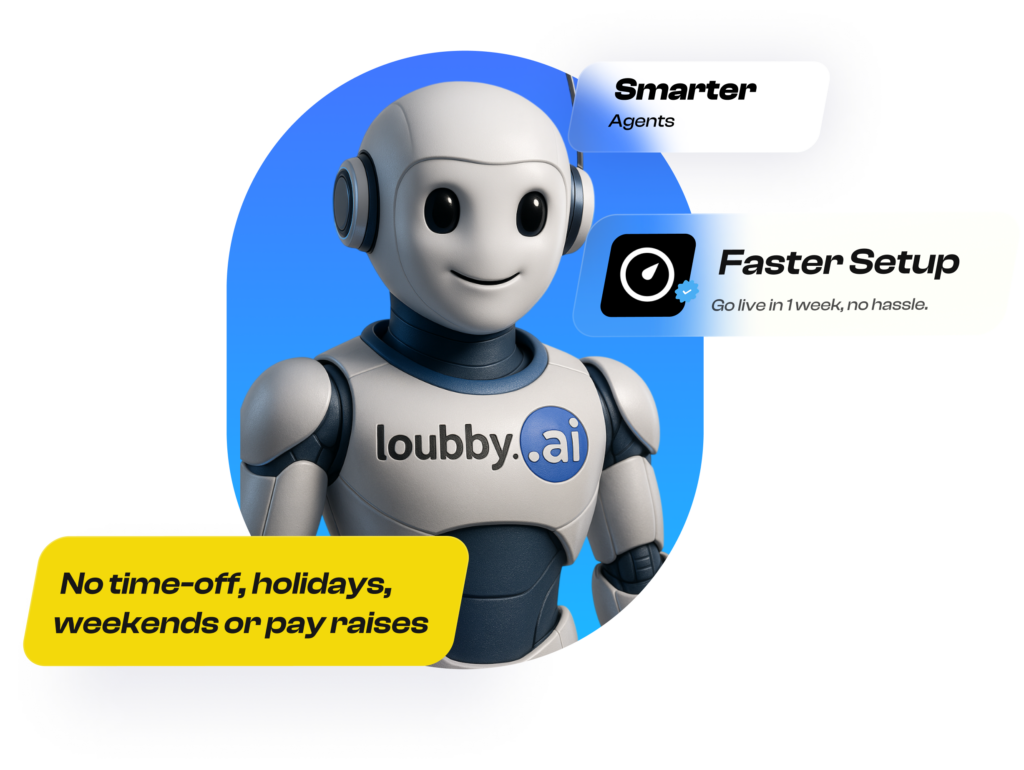Introduction
As remote work becomes the new standard for many organizations, effectively onboarding remote employees has grown increasingly crucial. Traditional onboarding processes often involve time-consuming, repetitive tasks that take HR professionals and managers away from more strategic responsibilities. However, automated onboarding offers a solution that not only saves time but also increases productivity and employee engagement from day one. With Loubby AI leading the charge in Africa, companies can now streamline onboarding to create an efficient, engaging experience that sets remote teams up for success.
This article will give you a better understanding of the concept of automated onboarding, examine its positive impact on productivity for remote teams, and explore how Loubby AI makes onboarding smoother and smarter.
Why Effective Onboarding Matters for Remote Teams
Before we go into automation, it is important to understand why onboarding is essential for remote teams. Studies show that well-structured onboarding improves employee retention by 82% and boosts productivity by over 70%. However, remote teams face unique challenges, including communication barriers, time zone differences, and a lack of physical presence that can make new hires feel isolated or disconnected. In addition, disorganized or inefficient onboarding process exacerbates these issues, leading to low morale, decreased productivity, and potentially high turnover of employees.
For remote teams, effective onboarding is crucial not only for knowledge transfer but also for creating a sense of belonging and connection. Automated onboarding, therefore addresses these challenges by standardizing processes, making onboarding efficient and thorough, and freeing HR teams to focus on more meaningful employee engagement strategies.
What is Automated Onboarding?
Automated onboarding refers to the use of technology to streamline the steps required to bring a new hire up to speed. This process can include task automation for paperwork, training schedules, role-specific introductions, setting up accounts, and providing access to company resources. Through automated workflows, AI-powered platforms like Loubby AI take over these repetitive tasks, allowing new hires and HR staff to focus on higher-value activities.
Automated onboarding can deliver:
- Standardized training modules that cover essential company policies and role-specific information.
- Digitalized forms that can be completed and signed online.
- Automated reminders for important tasks like completing paperwork or scheduling introductory meetings.
- Role-specific workflows that are customized for each new hire, ensuring they receive the right training at the right time.
How Automated Onboarding Saves Time for Remote Teams
1. Reduction in Administrative Tasks
HR departments spend an average of 45 hours onboarding each new employee in traditional settings. For remote teams, this often involves countless emails, document exchanges, and calendar setups, which are time-consuming and susceptible to errors. Loubby AI automates these steps, significantly reducing the time spent on paperwork and follow-up emails by digitalizing the process. Automated workflows route tasks to the right people at the right time, reducing unnecessary delays and ensuring new hires complete each step promptly.
2. Elimination of Repetitive Communication
For remote teams, initial communication with new hires usually involves introducing tools, sharing access credentials, and reviewing policies. These repetitive interactions are perfect candidates for automation. Loubby AI allows HR teams to send pre-set welcome messages, provide onboarding schedules, and introduce teams through automated emails or notifications. This allows new hires to access necessary information without waiting for manual responses, ensuring a smooth and quick transition into their roles.
3. Improved Training Management
Training schedules often vary by role, team, or project. Using Loubby AI, companies can create training workflows tailored to specific job functions, automating the sequence of training modules, assessments, and evaluations. New hires receive notifications when they complete each step, and progress is tracked without any manual intervention. This system ensures that employees access relevant training in an organized, timely manner, saving HR and team leaders hours of tracking and follow-up tasks.
4. Efficient Credential Management
Setting up credentials for various platforms is critical for remote teams, but it’s also a tedious process. With onboarding automation, platforms like Loubby AI can handle secure credential provisioning and access management automatically, ensuring that new hires are granted the appropriate permissions and access without manual intervention. Furthermore, new hires can begin work on their first day, equipped with all necessary tools, saving time and reducing frustration just by automating credential set up.
Boosting Productivity Through Automated Onboarding
1. Accelerating Time-to-Productivity
When new hires receive the resources and support they need immediately, they become productive faster. Loubby AI automates access to information, tools, and team resources, accelerating the time it takes for employees to reach full productivity. With tasks like paperwork, training, and introductions pre-automated, new hires can spend more time learning about their roles and less time on administrative tasks, allowing them to add value to projects sooner.
2. Enhancing New Hire Engagement
Engagement is a core component of productivity for teams working remotely; onboarding is an opportunity to establish strong bonds and familiarize new hires with the company’s culture. Loubby AI facilitates this process by integrating team introductions, social meet-and-greets, and culture videos into the onboarding workflow, creating a comprehensive and welcoming experience. Having a structured onboarding plan allows new hires to feel more connected and engaged, contributing to their overall productivity.
3. Reducing Onboarding Errors
Manual onboarding processes are often riddled with errors, from missed paperwork to forgotten meetings. These small errors add up, resulting in delays, miscommunication, and frustration. Automated onboarding via Loubby AI reduces the likelihood of human error by following consistent workflows. Every new hire receives the same high-quality experience, with fewer disruptions that can hinder productivity.
4. Enabling Scalable Onboarding for Growing Teams
As companies scale, so do the challenges of onboarding multiple employees simultaneously. Manually handling several new hires at once can strain HR resources, especially for remote teams. Loubby AI’s scalable automated onboarding process enables companies to onboard multiple employees without sacrificing quality or increasing HR workloads. Therefore, by handling routine tasks, automated onboarding empowers HR teams to focus on culture-building and support, resulting in a more productive and cohesive team.
The Role of Loubby AI as the Enabler
Loubby AI has an advanced onboarding platform designed to handle the unique needs of remote teams. Its AI-powered workflows enable a highly personalized onboarding experience that accommodates the idea of individual roles and team dynamics. Here’s how Loubby AI stands out as a productivity enabler:
AI-Driven Personalization: Loubby AI tailors each new hire’s onboarding path, ensuring that they receive relevant content, introductions, and training. This personalized approach fosters a stronger sense of belonging and prepares employees to contribute to their teams more effectively.
Streamlined Workflow Automation: From form filling to task reminders, Loubby AI automates repetitive tasks that would typically burden HR and managers. With Loubby AI handling these steps, HR can focus on building relationships and providing meaningful support.
Robust Analytics for Continuous Improvement: Loubby AI provides insights into the onboarding process through analytics and reporting tools. By identifying bottlenecks, tracking completion rates, and analyzing new hire feedback, companies can continuously refine their onboarding processes for better results.
Enhanced Security and Compliance: For remote teams handling sensitive data, Loubby AI’s secure credentialing system and compliance tracking are invaluable. Automated onboarding includes safeguards that prevent unauthorized access, giving remote teams a secure environment to operate in from day one.
Real-World Impact: Consider a growing tech company with remote teams distributed across five continents for instance. Before implementing automated onboarding, the HR team struggled to onboard employees from different time zones efficiently. With automated onboarding, the company saw a 60% reduction in onboarding time, as well as a notable increase in employee engagement. Automated introductions and task scheduling empowered new hires to complete their onboarding without delays, regardless of their location. Productivity metrics showed that these new employees reached full productivity 30% faster compared to those onboarded manually.
Conclusion
Automated onboarding is no longer a luxury for remote teams; it is a necessity. By streamlining administrative tasks, enhancing engagement, and accelerating time-to-productivity, onboarding automation significantly benefits both employees and employers. Platforms like Loubby AI enable remote companies to provide a seamless onboarding experience that boosts productivity while reducing the workload on HR teams.
As companies continue to embrace remote work, leveraging AI-driven solutions like Loubby AI will be crucial in creating effective onboarding experiences that attract and retain top talent, set new hires up for success, and ensure that organizations remain competitive in a rapidly evolving market.







